RSNA Global Learning Centers Expand Training in Women's Health
Recent visits provide needed education and training to create awareness and pathways for access

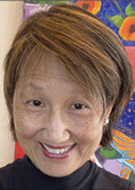
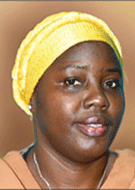
During Women's Health Month, RSNA News highlights the pivotal role radiology plays in support of women's health. This is the third of three stories. Read parts one and two
When the faculty teams met to determine education needs at the RSNA Global Learning Center (GLC) at Cipto Mangunkusumo National Referral Hospital at the University of Indonesia (FKUI/RSCM) in Jakarta, one area kept coming up: training in women’s breast imaging.
Recently, Stefanie Woodard, DO, associate professor of radiology at the University of Alabama Birmingham, visited Cipto Mangunkusumo National Referral Hospital as a guest lecturer. She provided three days of in-person lectures on a variety of breast imaging topics, including the use of imaging equipment, such as US, MRI and mammography, as well as discussions about specific diagnoses.
“The women’s imaging curriculum at Cipto Mangunkusumo National Referral Hospital is focused mostly on ultrasound and on diagnostic imaging. The primary work done in the breast imaging section is management of both benign lesions and advanced cancers,” Dr. Woodard said. “During my lecture, the residents asked excellent questions especially on breast MRI, including MRI techniques and utility of various sequences.”
Wei Yang, MD, chair, Department of Breast Imaging, University of Texas MD Anderson Cancer Center, visited last fall to also provide onsite education.
“The areas of greatest interest at the hospital are appropriate use criteria for routine breast imaging modalities, indications for biopsy, radiologic-pathologic concordance and next steps in management,” Dr. Yang said. “We also discussed multidisciplinary management paradigms for high-risk and cancer care, during and post-treatment, and steps to increase awareness of the benefits of early breast cancer diagnosis using screening.”
Two concerns raised by the local radiologists during these visits were patients who present in the late stages of breast cancer, which limits the options of early intervention, and access to care for women in rural areas.
In addition, several socioeconomic issues can prevent women from seeking health care.
“The biggest socioeconomic barriers to consistent quality health are are the asymmetric social demographics and complex geographic limitations,” Dr. Yang said. “Patient education, especially through health fairs and women’s health education forums, can educate the next generation of women who can become ‘chief health officers’ for each family unit.”
During her visit, Dr. Woodard noticed that the hospital is well equipped to continue caring for its female patients, but there were some areas where they could use some help and additional training.
“In order to begin breast imaging-guided procedures, they would need the appropriate equipment, such as biopsy needles and clips, and would need the support of breast surgeons,” Dr. Woodard said.
Dr. Yang agrees and sees additional needs.
“It is important to train identified health care professionals and physicians with core competencies in the interpretation of breast US to be able to participate in the delivery of timely and quality care to patients in rural areas,” Dr. Yang said.
Both Drs. Woodard and Yang would welcome the opportunity to visit again, but for the time being look forward to working with the onsite faculty during virtual workshops and seminars that will focus on a multidisciplinary approach to the management of breast lesions and diagnostic imaging modalities.
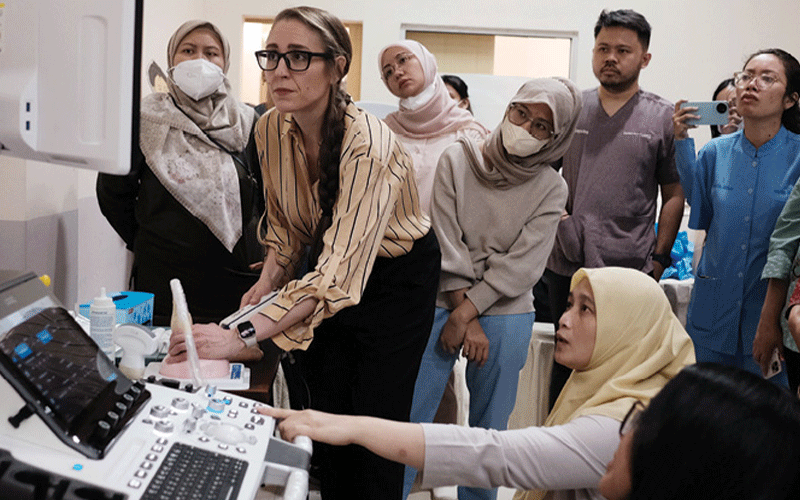
Mammography Suite Installed at GLC in Tanzania
At Muhimbili University of Health and Sciences (MUHAS) the women’s imaging curriculum is part of a series of fellowship programs created for the institution as part of its GLC. The GLC team worked together since 2020 to develop a curriculum that provides training and educational tools to improve access to breast cancer screening and help lower the country’s breast cancer mortality rate. MUHAS is the only university department in Tanzania that offers a master of radiology residency program with a focus on women's imaging.
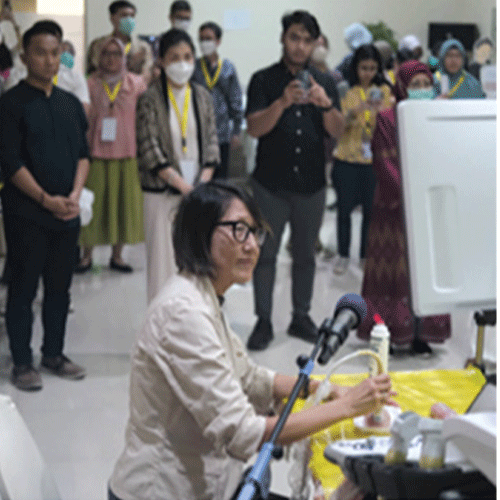
GLC team member and lecturer Zuhura Nkrumbih, MD, has a firsthand understanding of the potential reach of the new curriculum.
“There is no such program of female imaging in East Africa, thus the graduated fellows will be able to assist any consultations that will arise,” Dr. Nkrumbih said. “There is opportunity for fellows from other countries within East Africa or beyond the area to come to study the program here, thus we expect our university to be a key institution for providing knowledge and skills for female imaging.”
However, the hospital does not currently have a working mammography machine. As part of a new agreement, GE HealthCare will install the GE Health- Care Senographe Pristina Mammography Suite, which includes 2D and 3D digital breast tomosynthesis, contrast enhanced mammography (CEM), CEM biopsy capabilities and SenoIris workstation, at Muhimbili National Hospital (MNH) and provide maintenance of the system. The GE education grant will include training for 20 nurses, radiologists and radiology technologists at the hospital.
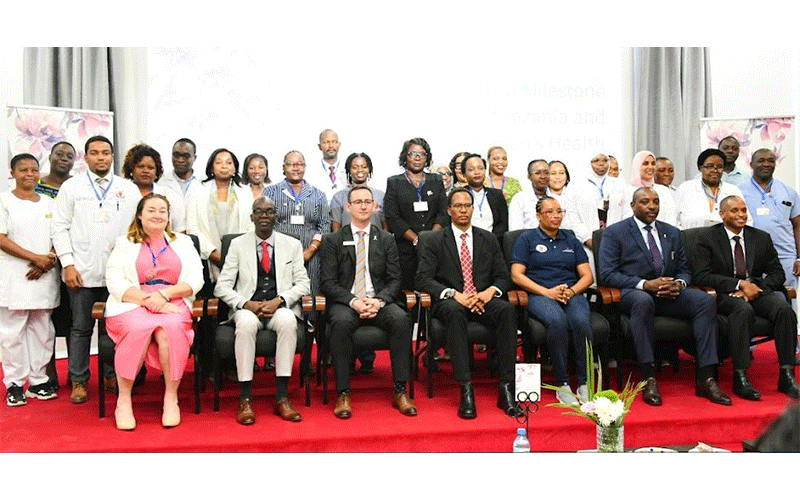
The breast center at Muhimbili National Hospital was unveiled during a recent celebration. GE HealthCare and RSNA stakeholders and Muhimbili National Hospital staff as well as other dignitaries were in attendance.
In addition to improving the level of radiologic practice and breast care throughout the region, the collaboration between GE HealthCare and RSNA will also work to raise awareness about the importance of breast cancer screening and early detection among Tanzanians.
“RSNA’s Global Learning Center program was designed to expand radiology education across the world and foster international collaborations. Through this collaboration with GE HealthCare, we are able to work with local stakeholders at MNH to advance a breast imaging curriculum, provide in-person hands-on training in mammography, and offer online courses, technical assistance and virtual support,” said Umar Mahmood, MD, PhD, chair of the RSNA Board of Directors. “Bringing this critical training and technology to MUHAS will improve access to quality patient care throughout the region and save lives.”
The RSNA GLC at MUHAS is funded by a grant from the U.S. Department of Energy’s National Nuclear Security Administration (NNSA).
For More Information
Learn more about the RSNA Global Learning Centers.
Read previous RSNA News stories about the Global Learning Centers: